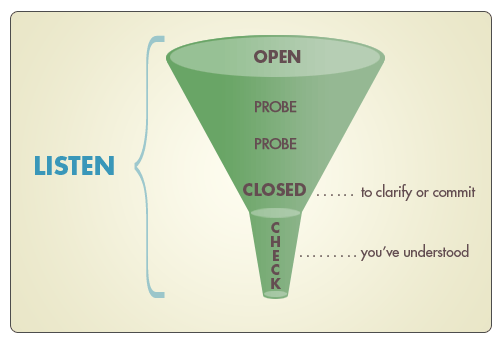Lesson 7: Listening
Attention

This is an interesting use of the term "LISTEN" to refer to the steps in active listening!

This is a good graphic depicting the process of understanding information...and this is YOUR goal...your goal in college is to understand the information, your active participation is needed. There is no Matrix-based plug in to put knowledge into your head!

Learning Outcomes
Upon completion of this lesson's material, students will be able to:
- Identify verbal and non-verbal components of communication
- Identify specific personal and environmental barriers to effective communication
- Describe attributes of personal communication style
- Identify the impact of distraction, preconceptions, self-absorption, and day dreaming on listening
- Create an "Effective Listening" plan
Teaching
Being an "active learner" is an expectation of college and your instructors. College instructions is much more directed by the STUDENTS who need to take an active part in selecting material to study...it is not always laid out in front of you with instructions saying "memorize this" or "do that".
For the sake of this lesson on "active listening" consider the following tips when you are in a situation (such as a lecture, interview, or a group exercise):
- Really listen to a person instead of fazing out into your own dreamworld!
- Mentally try and repeat what they are saying back to yourself so that you are active and get it right.
- Do not interrupt someone when they are speaking to you. Not only is it insulting but you'll leave out on important information if you do that.
- After they've spoken and there are doubts lingering, get clarifications by asking questions.
- Always maintain eye contact with a person who speaks so that you don't drift and the person knows that you are listening to him/her.
- One great way to pay attention and understand what the other person is saying, is to provide proper feedback. This would involve verbal methods as well as using a positive body language.

By engaging in active listening not only will you learn better but you will learn more and the time in class will seem to "fly by"! This is particularly useful if you are in "boring" lectures. Remember, everyone, including that boring professor is saying important things...it may not seem so at the time, but you never know when that information is going to be useful to you!
Effective Listening
- Being physically prepared
- Being open
- Discerning the noise
- Being curious
- Asking questions
- Listening for meaning
- Reflecting on meaning
Assessment
Lesson 7 Discussion
In this discussion I want you to share your experiences about how active participation in class has been expected of you in your scholastic history. Did some instructors demand that everyone participate? What about group work? What about question and answer sessions? What concerns might you have about the expectations for active listening and participation in college? Have you ever had to learn from a BORING instructor?